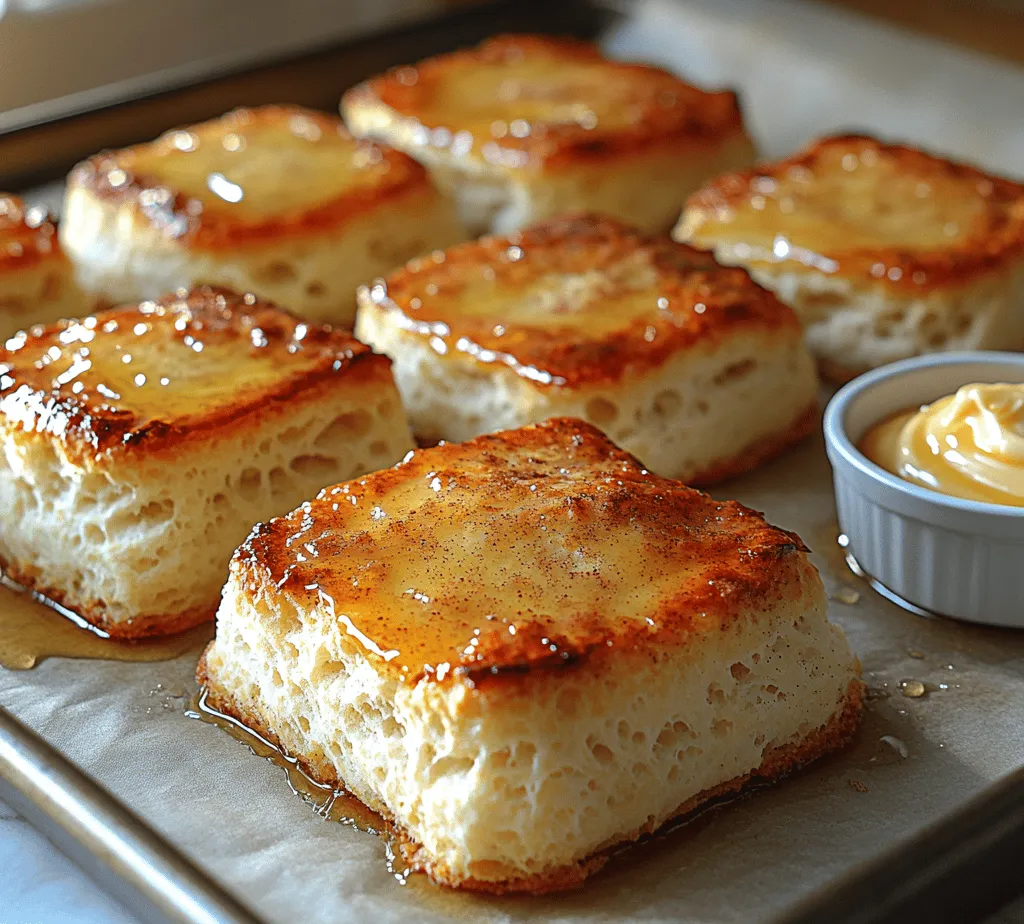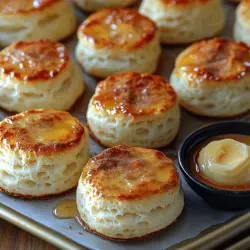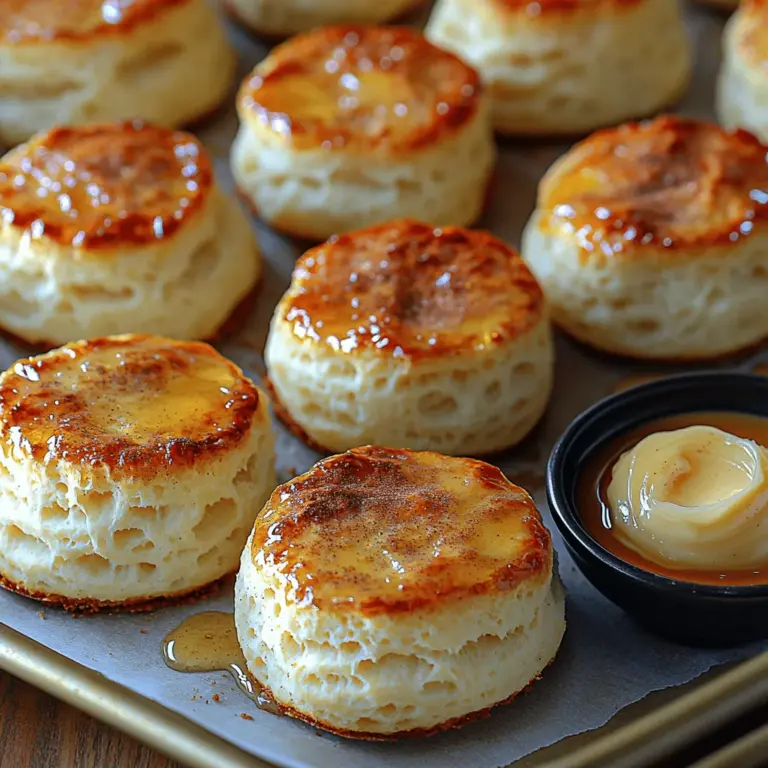Introduction
There’s something undeniably comforting about homemade biscuits. The aroma wafting through your kitchen, the warm, flaky layers, and that first bite that yields to a buttery softness is an experience that can bring back cherished memories or create new ones. Biscuits are a staple in many homes, often served as a side dish or enjoyed on their own, slathered with butter or jam. However, when you elevate this classic treat with the luscious addition of honey butter, you have a recipe that transforms an ordinary biscuit into an extraordinary one.
Sticky Honey Butter Biscuits blend the traditional goodness of homemade biscuits with the sweet, rich flavor of honey butter, creating a delightful treat that is perfect for breakfast, brunch, or as a comforting snack any time of the day. This recipe promises not just a beautiful golden-brown color but also a melt-in-your-mouth texture that will have everyone reaching for seconds.
In this article, we will dive into the art of biscuit making, exploring the key elements that contribute to their light and flaky texture. We will also break down the ingredients that make these Sticky Honey Butter Biscuits a standout addition to your baking repertoire, ensuring that you have all the knowledge to create this delicious treat at home.
Understanding the Basics of Biscuit Making
Creating the perfect biscuit is an art that hinges on understanding the fundamentals of baking. The goal is to achieve a flaky, tender texture that crumbles gently when bitten into. The secret lies in the careful selection and handling of ingredients, as well as the techniques used during preparation.
What Makes a Biscuit Flaky and Tender?
The hallmark of a great biscuit is its flakiness, which comes from the layers of dough that separate during baking. This flakiness is achieved by incorporating fat—most commonly butter—into the flour, creating small pockets that steam during the baking process. The result is a delightful texture that is both light and tender.
To achieve this, it’s essential to work quickly and keep your ingredients cold. The cold fat (butter) is cut into the flour until it resembles coarse crumbs, which is crucial for creating those flaky layers. When the biscuits are baked, the steam generated by the melting butter creates the desired lift and separation in the dough.
The Role of Ingredients in Biscuit Texture
Every ingredient in your biscuit recipe plays an important role in determining its final texture and flavor. Here’s a closer look at the key ingredients that contribute to the success of your Sticky Honey Butter Biscuits:
Flour: Types and Their Impact
All-purpose flour is the most commonly used flour for biscuit making due to its balanced protein content, which provides the necessary structure without making the biscuits tough. When measuring flour, it’s important to use the correct method to avoid adding too much. Fluffing the flour in the container, spooning it into your measuring cup, and leveling it off with a knife ensures accuracy.
For a lighter texture, some bakers may choose to mix all-purpose flour with cake flour, which has a lower protein content, further enhancing tenderness.
Baking Powder and Baking Soda: Leavening Agents
Leavening agents are vital for creating the rise in your biscuits. Baking powder is a combination of an acid and a base, which produces carbon dioxide gas when it reacts with moisture and heat. This gas expands the dough, creating the desired lightness.
Baking soda, on the other hand, is a pure base that requires an acid (like buttermilk) to activate. Many biscuit recipes utilize both baking powder and baking soda to ensure the perfect rise and a tender crumb.
The Significance of Cold Butter
Using cold butter is one of the most important tips for making biscuits. When cold butter is cut into flour, it creates those desirable flaky layers. As the biscuits bake, the cold butter melts and produces steam, which helps to lift the layers. For the best results, cut your butter into small cubes and refrigerate it until you’re ready to use it.
The Importance of Buttermilk in Achieving Moisture and Tang
Buttermilk is a beloved ingredient in biscuit recipes due to its ability to impart moisture and a slight tanginess that balances the richness of the butter. The acidity in buttermilk also helps to tenderize the dough, ensuring a soft biscuit. If you don’t have buttermilk on hand, you can easily make a substitute by mixing milk with a tablespoon of lemon juice or vinegar and letting it sit for a few minutes.
Ingredients Breakdown
To create the perfect Sticky Honey Butter Biscuits, you’ll need a selection of quality ingredients. Here’s a detailed breakdown of each component of the recipe, highlighting their functions and best practices.
All-Purpose Flour: Best Practices for Measuring
– Function: Provides structure to the biscuits.
– Best Practices: When measuring flour, use the spoon-and-level method. Avoid scooping directly from the bag, as this can compact the flour and lead to too much being used.
Baking Powder and Baking Soda: How They Work Together
– Function: Both are leavening agents that help the biscuits rise.
– How They Work Together: Baking powder provides a lift right away, while baking soda activates with the buttermilk to give an additional boost. Ensure they are fresh for maximum effectiveness.
Salt: Enhancing Flavors
– Function: Salt enhances the overall flavor of the biscuits and balances sweetness.
– Tip: Use fine sea salt for even distribution throughout the dough.
Sugar: Balancing Sweetness
– Function: Sugar adds a touch of sweetness and helps with browning.
– Tip: For Sticky Honey Butter Biscuits, a small amount of sugar is often added to complement the honey in the butter.
Butter: Why Cold is Crucial
– Function: Creates a flaky texture when cold butter is cut into the flour.
– Tip: Use high-quality unsalted butter for the best flavor control.
Buttermilk: Alternatives and Why It Matters
– Function: Adds moisture and a slight tang to the biscuits.
– Alternatives: If you don’t have buttermilk, mix milk with vinegar or lemon juice to create a similar effect.
Overview of Honey Butter Ingredients
– Honey: The star ingredient in the honey butter, providing natural sweetness and a sticky texture.
– Butter: Used to create a spreadable consistency.
– Optional Cinnamon: A warm spice that can elevate the flavor profile of the honey butter.
– Salt: A pinch of salt balances the sweetness in honey butter, enhancing the flavor.
The Choice of Honey: Different Types and Flavors
When selecting honey for your sticky honey butter, consider the flavor profile. Clover honey is mild and sweet, while wildflower honey offers a more robust flavor. Local honey can also bring unique floral notes that enhance your biscuits.
Optional Cinnamon: When and Why to Use It
Cinnamon adds warmth and depth to the flavor of honey butter. If you enjoy a hint of spice, consider adding a small pinch to your honey butter mixture. It can elevate the overall flavor and provide a delightful contrast to the sweetness of the honey.
Salt: Balancing Sweetness in Honey Butter
A small amount of salt in your honey butter can help to enhance the sweetness, creating a more complex flavor profile. Just a pinch is enough to bring out the best in your honey butter without overpowering the natural sweetness.
With a solid understanding of the ingredients and their roles, you are well on your way to creating the perfect Sticky Honey Butter Biscuits. In the next part of this article, we will delve into the step-by-step instructions for making these delightful biscuits, as well as tips for achieving the best results. Stay tuned as we guide you through the delightful process of biscuit making!

Step-by-Step Instructions for Perfect Biscuits
Preheating the Oven: Why the Right Temperature Matters
Before you start mixing your ingredients, preheat your oven to 425°F (220°C). This initial step is crucial as it ensures that your biscuits rise beautifully and develop a golden crust. An adequately preheated oven creates the necessary steam that helps the biscuits to puff up, contributing to their delightful flakiness. If you place the biscuits in an oven that isn’t hot enough, they may spread out rather than rise, resulting in a denser texture that is far from ideal.
Mixing Dry Ingredients: Tips for an Even Blend
In a large mixing bowl, combine 2 cups of all-purpose flour, 2 tablespoons of granulated sugar, 1 tablespoon of baking powder, and 1/2 teaspoon of salt. Use a whisk to thoroughly mix these dry ingredients. Whisking helps to aerate the flour and evenly distribute the baking powder, ensuring that your biscuits rise uniformly. Avoid over-mixing at this stage; just ensure no visible clumps remain. This will set the foundation for light and tender biscuits.
Incorporating Cold Butter: Techniques for the Right Consistency
Next, it’s time to incorporate 1/2 cup (1 stick) of cold unsalted butter. Cut the butter into small cubes and add it to your dry mixture. Using a pastry cutter, two forks, or your fingers, work the butter into the flour until the mixture resembles coarse crumbs. This technique is essential as the cold butter creates pockets of fat that will melt during baking, resulting in flaky layers. Be careful not to overwork the dough; you want to see small bits of butter still visible for the best texture.
Adding Buttermilk: Understanding the Mixing Process
Once your butter is incorporated, create a well in the center of the mixture and pour in 3/4 cup of cold buttermilk. Using a spatula, gently fold the mixture together until just combined. Avoid stirring vigorously; the key is to mix until no dry flour remains visible. Over-mixing at this stage can lead to tough biscuits, so it’s okay if the dough is a bit shaggy. If you don’t have buttermilk, you can make a substitute by combining regular milk with a tablespoon of vinegar or lemon juice, letting it sit for about 5 minutes.
Shaping the Dough: The Science Behind Folding for Flakiness
Once your dough is combined, turn it out onto a lightly floured surface. Knead it gently about 3-4 times, just enough to bring it together. Then, flatten it into a rectangle about 1 inch thick. This folding technique is crucial for developing those flaky layers. Fold the dough over itself in thirds, similar to folding a letter, and then gently press it down again. Repeat this process a couple of times. Each fold creates layers, contributing to that desirable flakiness.
Cutting Out Biscuits: Tips for Achieving Clean Cuts
Now, it’s time to cut out your biscuits. Using a floured biscuit cutter (or even a glass), press straight down into the dough without twisting; this helps to maintain the integrity of the layers. Place the cut biscuits on a baking sheet lined with parchment paper, ensuring they are close together but not touching. This positioning allows them to rise upwards rather than spread out during baking.
Baking: Signs of Perfectly Baked Biscuits
Bake your biscuits in the preheated oven for about 12-15 minutes or until they are golden brown on top. Keep an eye on them, as oven temperatures can vary. The biscuits should be puffed up, and the bottoms should be lightly browned. When you tap them lightly, they should sound hollow. Once baked, remove them from the oven and let them cool slightly on a wire rack. This cooling time allows the steam to escape, preventing sogginess.
Creating the Honey Butter
Importance of Preparing Honey Butter While Biscuits Bake
While your biscuits are baking, it’s the perfect time to whip up your honey butter. This delicious spread complements the warm, flaky biscuits perfectly. By preparing the honey butter during the baking process, you ensure that it’s ready to slather on your biscuits as soon as they come out of the oven.
Techniques for Achieving a Smooth, Spreadable Honey Butter
To make the honey butter, start by softening 1/2 cup (1 stick) of unsalted butter at room temperature. In a mixing bowl, combine the softened butter with 1/4 cup of honey and a pinch of salt. Using a hand mixer or whisk, blend the ingredients until the mixture is light and fluffy. This process should take about 2-3 minutes. The salt enhances the flavor and balances the sweetness of the honey, making your honey butter irresistible.
Flavor Variations and Enhancements for Honey Butter
For an extra twist, consider adding flavor variations to your honey butter. A teaspoon of cinnamon or vanilla extract can elevate the taste profile. If you’re feeling adventurous, try incorporating a bit of lemon zest for a refreshing citrus note. You can also experiment with different types of honey, such as clover or wildflower, to add unique flavors to your butter.
Serving Suggestions
Best Ways to Serve Sticky Honey Butter Biscuits
Once your biscuits are baked and cooled slightly, it’s time to serve them. Warm the biscuits slightly in the oven or microwave before serving, as this enhances their flavor and texture. Cut the biscuits in half and generously spread the honey butter on top. The warm biscuits will melt the honey butter slightly, creating a deliciously gooey experience.
Pairing Ideas: What to Enjoy with Your Biscuits
These sticky honey butter biscuits make for a delightful breakfast, brunch, or snack. Pair them with a warm cup of coffee or tea for a cozy morning treat. They also complement savory dishes beautifully; serve them alongside fried chicken, soups, or salads for a satisfying meal. For a dessert twist, enjoy them with fresh fruit like berries or peaches.
Storing Leftover Biscuits and Honey Butter
If you have any leftover biscuits, store them in an airtight container at room temperature for up to 2 days. To retain their freshness, you can also refrigerate them for up to a week. Simply reheat them in the oven or microwave before serving. The honey butter can be stored in the refrigerator in a sealed container for up to a month. Just be sure to let it come to room temperature before spreading.
The Joy of Baking with Family and Friends
The Social Aspect of Baking: Creating Memories
Baking is often a communal activity that brings family and friends together. The process of making Sticky Honey Butter Biscuits can be a delightful way to bond with loved ones. Invite family members or friends to help in the kitchen, allowing everyone to contribute. Sharing stories and laughter while baking creates cherished memories that will last long after the biscuits are gone.
Encouraging Experimentation with Flavors and Ingredients
Baking also offers a wonderful opportunity for experimentation. Encourage your loved ones to try out different flavor combinations or add-ins. Perhaps someone wants to incorporate herbs into the biscuit dough or try different sweeteners for the honey butter. This creativity not only makes the baking experience more enjoyable but also leads to new and exciting flavor discoveries.
The Satisfaction of Homemade vs. Store-Bought
There’s a unique satisfaction that comes from baking from scratch. The aroma of freshly baked biscuits wafting through the kitchen, the anticipation of watching them rise, and the joy of sharing your creation with others are experiences that store-bought products simply cannot replicate. Homemade Sticky Honey Butter Biscuits are a labor of love that yields delicious rewards, making the effort worthwhile.
Conclusion
In summary, making Sticky Honey Butter Biscuits is not just about creating a delectable treat but also about enjoying the entire process. From the careful selection of ingredients to the satisfaction of watching them rise in the oven, every step is filled with joy and anticipation. These biscuits offer a delightful combination of flaky texture and sweet honey butter that is sure to impress anyone who tastes them.
I encourage you to try this recipe, whether for a special occasion or just because. Share them with your loved ones, and create lasting memories together in the kitchen. The experience of baking from scratch, combined with the satisfaction of sharing delicious homemade biscuits, is truly one of life’s simple pleasures. Embrace the joy of baking and relish every bite of your Sticky Honey Butter Biscuits!


